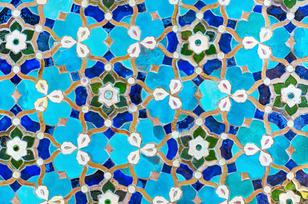 A Blue Islamic Design in St. Petersburg, Russia (unsplash.com) A Blue Islamic Design in St. Petersburg, Russia (unsplash.com) By profession, I teach languages and communicating across cultures. By nature, I’m a student of the same. From the age of six or seven, I’ve reached out to people from countries, cultural identities, and/or cultural traditions different from mine, eager to learn what they were willing to share. Over the years it has led to many fertile conversations in public spaces like airports/airplanes, libraries, workplace areas, reception areas, or on bumpy bus rides. But not always. One day I welcomed a woman into my office, where I developed training in the human services. She was about 27 years old and wearing an elegant patterned blue scarf. She had been born and raised in Algeria, although I didn’t know it at the time. Someone had referred her to me as an expert on the Muslim faith who might be willing to co-train a workshop with me for social workers on working with families who are Muslim. I noticed the exquisite details on her scarf and the beauty with which she pronounced her greeting in English. She smiled at me brightly and I invited her to take a seat. Thirty seconds into the conversation I asked her warmly where she was from. She paused, her eyes flashed, and she sat up straight in her seat. “I don’t see why you should ask me such a question,” she answered. “Why do you assume I am not American? In fact, I and all my family are American citizens. So, now, what is your next question, please?” Ouch. All my life I had been asking people where they were from, and no one had responded like this. What had happened this time that made the question offensive? What had gone wrong? Among other possibilities, I believe September 11, 2001 (which had taken place nine months earlier) may have been what had happened. It was another time when an entire population of Muslims across the world were subject to being treated with suspicion or hostility due to the reprehensible acts of a few people—a few who had chosen to call themselves “Muslim.” So, perhaps my question felt like a “fishing expedition” to her—to check whether where she was from was “okay” in my eyes. “I’m sorry,” I said, feeling my face get hot and my throat tighten up, then repeating “I’m sorry,” a few seconds later. “I can understand why you might feel that way.” Well, the truth was that I did and I didn’t. Isn’t she the one now making assumptions about me? I asked myself defensively. Still, I noticed she softened, and twenty minutes later she told me she’d be glad to do the training with me. But at the end of the day, I secretly wondered why she had recoiled from my well-meaning question. But then, four months later… …I walked into my bank to deposit a check (that’s how we deposited back in the day). The teller, whom I recognized from previous visits but whose name I still didn’t know, smiled warmly, took the check, and took a quick glance at it. When she looked up again, I saw her eyebrows knit with concern. “Hello, Mrs. Ahmadi… Are you from an Iranian family?” My face grew hot and I felt my throat tighten again, but for very different reasons from the time before. Suddenly, the tables were turned--with an uncomfortable spotlight shining on ME. “Well, yes; my husband is Iranian” I said, after several heartbeats. At least I wouldn’t have long to wait for her answer. “Oh!” she responded, almost immediately, “I hope all of you are feeling safe!” I thanked her in that profound moment of relief. And as I left, I glanced at her nametag and remembered ever after that her name was “Lisa.” I also thought of my good colleague Layla (the woman who I had the privilege of co-training with), and suddenly her reaction to my asking her national origin all made perfect sense to me. As for the teller who had asked if I was from an Iranian family, I understood her intention and was truly grateful for it, but it gave me pause to consider how to reach out to people “from a different culture (country, faith, tradition,” etc.) ever since. So I took it upon myself to ask several people from either side of discussions like these, to draw from my profession and lived experiences, and to create a guide for anyone who would like some suggested strategies on How to Break the Ice with “Someone from a Different Culture.” To get the free download of the guide, just click on the link. All the best in your future interactions!
0 Comments
|
AuthorDr. Leslie Ahmadi discovered her intercultural calling in her parents’ home at age four--where between the jazz, the spirituals, and the rock ‘n roll music, she heard folk songs in languages from around the world. Thirty years later she had a doctorate in foreign language and culture education--and her folk song guitar never far away. Archives
July 2024
Categories |

 RSS Feed
RSS Feed